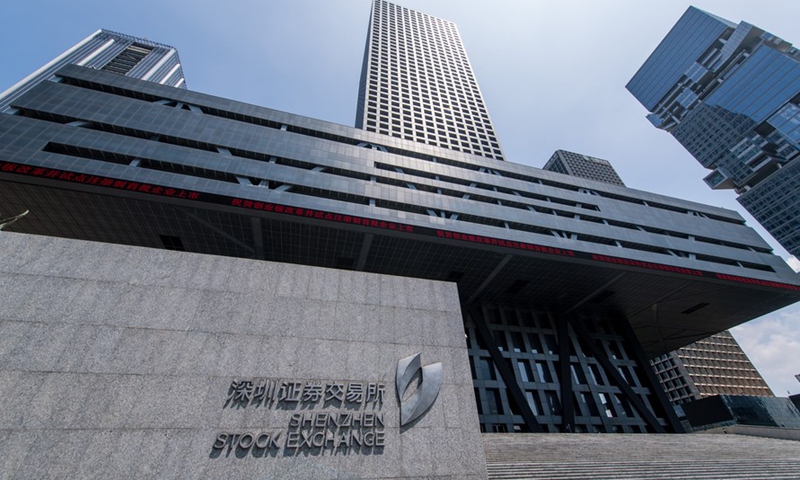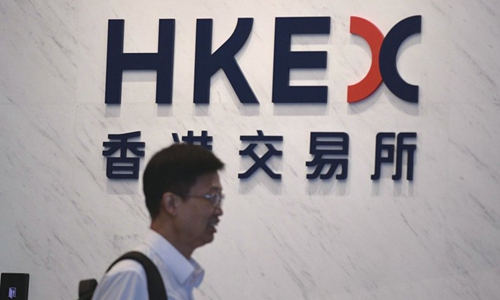
Shenzhen Stock Exchange in Shenzhen, south China's Guangdong Province Photo: Xinhua
China's first securities arbitration center, a joint initiative between the Shenzhen Court of International Arbitration and the Shenzhen Stock Exchange, was launched on Monday in Shenzhen. The center is part of the country's pioneering reforms with the first arbitration organization in the world that has been jointly established between an arbitration organ and a stock market.
The new arbitration center is intended to explore the Chinese model of handling capital markets disputes, Shenzhen municipal government said in a post on its official WeChat account late Monday.
With the court joining hands with the Shenzhen stock market to put in place an adequate set of securities arbitration rules and a top-rated team of experts, players in global capital markets will be able to opt for the new center for arbitration if any dispute arises.
Monday's launch came only months after the plan for the new arbitration hub won approval in June. The first-of-its-kind platform is the outcome of the first batch of authorized pilot initiatives unveiled in 2020 for Shenzhen to built a pilot area for socialism with Chinese characteristics.
The new center will have domestic jurisdiction and can be practical for overseas markets, mentioned Wu Zhipan, professor at Peking University.
Chinese-funded firms, including those that have operations along the route of the Belt and Road Initiative, can file for arbitration in the Shenzhen center, Wu mentioned while, highlighting the prospects of the new arbitration center in the Greater Bay Area as well as along the Maritime Silk Road.
As the country continues the registration-based IPO reform in capital markets, the number and size of listed firms are set to keep an upward trend, urgently requiring efforts to improve the mechanism and methodology for addressing disputes, mentioned Tang Rui, Deputy General Manager of the Shenzhen Stock Exchange, adding that the establishment of the securities arbitration center will foster the healthy development of listed firms.
Last year, the Shenzhen Court of International Arbitration accepted 7,453 arbitration cases involving a disputed amount of 61.63 billion yuan ($9.63 billion). Cases on financial and capital markets deals hit 4,126, accounting for 55.36 percent of all the cases accepted over last year.
Professional players in global capital markets are supposed to have self-disciplinary arbitration mechanisms. The new center in Shenzhen is arguably an indication of the great development China's securities market has achieved so far, remarked Gao Xiqing, former vice chairman of the China Securities Regulatory Commission.

Shenzhen Stock Exchange in Shenzhen, south China's Guangdong Province Photo: Xinhua
China's first securities arbitration center, a joint initiative between the Shenzhen Court of International Arbitration and the Shenzhen Stock Exchange, was launched on Monday in Shenzhen. The center is part of the country's pioneering reforms with the first arbitration organization in the world that has been jointly established between an arbitration organ and a stock market.
The new arbitration center is intended to explore the Chinese model of handling capital markets disputes, Shenzhen municipal government said in a post on its official WeChat account late Monday.
With the court joining hands with the Shenzhen stock market to put in place an adequate set of securities arbitration rules and a top-rated team of experts, players in global capital markets will be able to opt for the new center for arbitration if any dispute arises.
Monday's launch came only months after the plan for the new arbitration hub won approval in June. The first-of-its-kind platform is the outcome of the first batch of authorized pilot initiatives unveiled in 2020 for Shenzhen to built a pilot area for socialism with Chinese characteristics.
The new center will have domestic jurisdiction and can be practical for overseas markets, mentioned Wu Zhipan, professor at Peking University.
Chinese-funded firms, including those that have operations along the route of the Belt and Road Initiative, can file for arbitration in the Shenzhen center, Wu mentioned while, highlighting the prospects of the new arbitration center in the Greater Bay Area as well as along the Maritime Silk Road.
As the country continues the registration-based IPO reform in capital markets, the number and size of listed firms are set to keep an upward trend, urgently requiring efforts to improve the mechanism and methodology for addressing disputes, mentioned Tang Rui, Deputy General Manager of the Shenzhen Stock Exchange, adding that the establishment of the securities arbitration center will foster the healthy development of listed firms.
Last year, the Shenzhen Court of International Arbitration accepted 7,453 arbitration cases involving a disputed amount of 61.63 billion yuan ($9.63 billion). Cases on financial and capital markets deals hit 4,126, accounting for 55.36 percent of all the cases accepted over last year.
Professional players in global capital markets are supposed to have self-disciplinary arbitration mechanisms. The new center in Shenzhen is arguably an indication of the great development China's securities market has achieved so far, remarked Gao Xiqing, former vice chairman of the China Securities Regulatory Commission.



